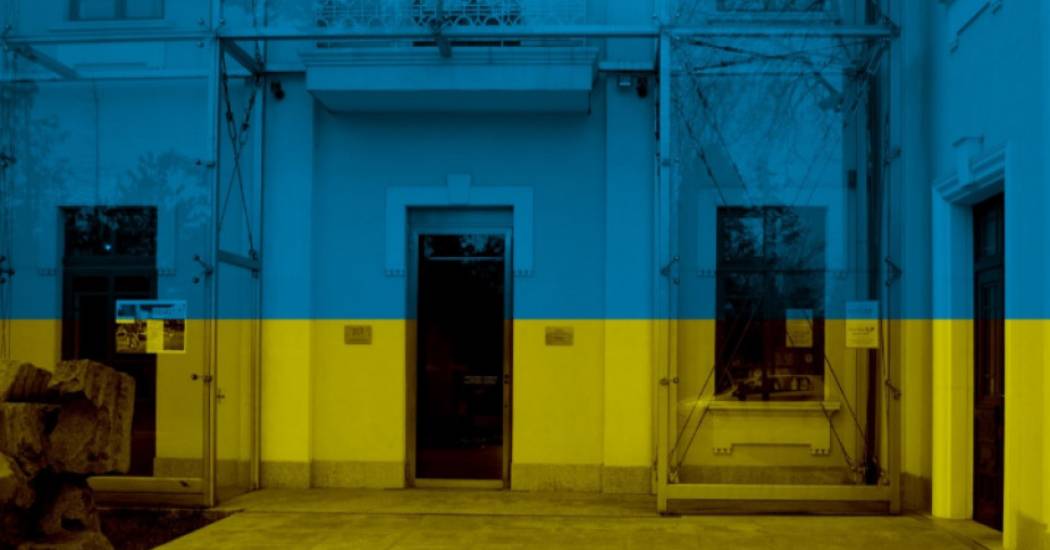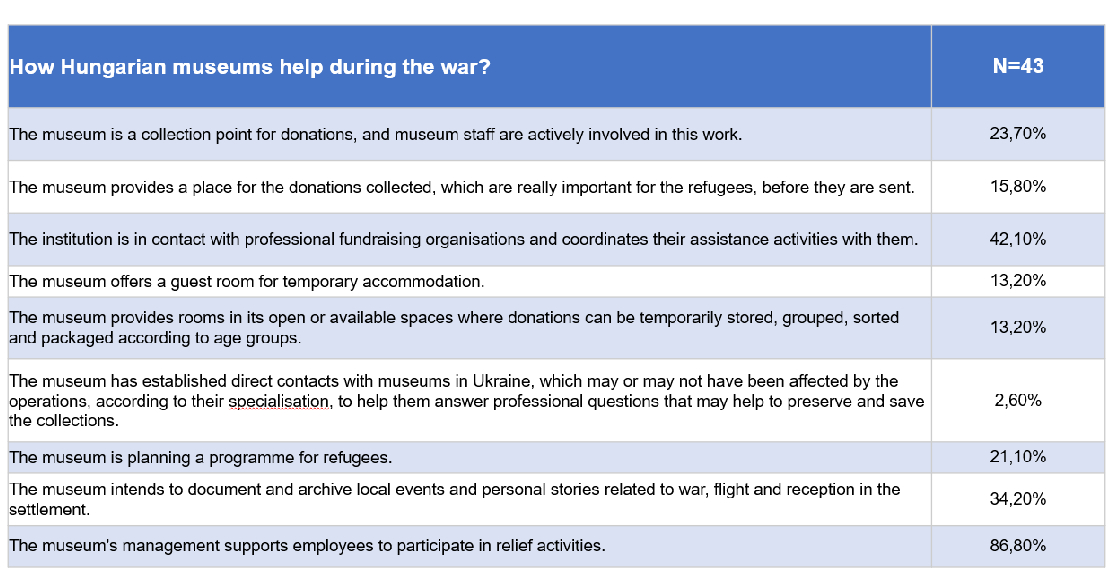
Museums’ social responsibility isn’t a new concept. Recent research by MMO (Magyar Múzeumok Online) reveals that more than half of the Hungarian museums are involved in assistance programmes related to the war in Ukraine.
Since the outbreak of the war, museums around the world have been raising their voices against armed conflict in order to protect human life and cultural property. At the same time, many Hungarian museums and museum staff strive to help the victims of the armed conflict, those who remain at home and those fleeing. We published recommendations for museum professionals titled “Whoever gives fast, gives twice, and even more is given by the one who gives well…” on Feb 28, 2022 by dr. Ibolya Bereczki, president of the Pulszky Society. Similarly impactful is the ICOM Hungary statement, as well as the joint announcement by the presidents of four national professional organisations for museums and public collections, that encourages individual institutions to respectively aid victims of war as much as possible.
In the spirit of the recommendations, The Hungarian Museums Online launched a rapid online survey of Hungarian museums, in which institutions with museum licences could participate between 1 March and 3 March 2022. (Here we thank Pulszky Society and MVMSZ for their support.)
A total of 43 institutions filled out the questionnaire, which revealed that 55.8% of them are currently participating in a support campaign. The research also revealed that a significant proportion of museums not only work to support the victims of the Ukrainian-Russian war, but 58.1% of them have already participated in assistance programmes. In 62.8% of institutions, several employees are committed to this field, and in 9.3% 1-1 people are actively involved in alleviating the suffering caused by the war. Museums in Pest (14.3%), Budapest, Komárom-Esztergom, Szabolcs-Szatmár-Bereg and Zala counties (9.5% everywhere) filled out the questionnaire, of which Szabolcs-Szatmár-Bereg County and Budapest institutions reported the most assistance actions. Regional museums were the most active, then city museums with county-wide scopes and national museums: 9 regional museums reported that they were providing organised assistance to victims of the war, 8 in county institutions and 3 in national museums.
The study also found that institutions responded similarly to the crisis.
Museums and their staff are participating in fundraising campaigns across the country. They collect long-lasting food, clothes, toiletries, raise money, prepare sandwiches, organise charity concerts, the proceeds of which are offered to those in need, they accommodate refugees, they serve at the fundraising points of their settlements, they participate in the transportation of aid. At the moment, for instance, the Paks Gallery and the Sóstó Open-Air Museum serve as fundraising points.
The Ottó Herman Museum in Miskolc collects donations from museum staff within its own organisation from 28 February 2022. On March 3, they packed the collected aid shipments, which they launched. In order for their efforts to be effective, they are in constant contact with the Ukrainian leading partner of their SmartMuseum project, the staff of the Munkácsi History Museum. The Miskolc museum also consult with their owner, but they can carry out independently the work already started. Transport is organised by them within Hungary. They have been housing refugees since last Monday in their Artists’ Residence. To this end, their existing previous bookings have not yet been cancelled, but new ones are no longer recorded.
The staff of the Ludwig Museum in Budapest prepare sandwiches twice a week, collect hygiene products once a week, as well as long-lasting food once a week. On a daily basis, the staff monitor fundraising needs and try to respond to those as quickly as possible.
The staff of the Munkácsy Mihály Museum in Békéscsaba have already acted as volunteers at the National Ambulance Service for the entire duration of the emergency caused by the epidemic, which they are still continuing to do.
The institutions also cooperate with various organisations. The Hungarian Museum of Environment and Water joined a fundraising campaign organised by its owner (National Directorate General for Water Management), and small institutions such as the Gyula Nagy Regional Museum of the Municipality of Orosháza are assisting the work of the mayor's office. Some of the staff of the Jósa András Museum in Nyíregyháza helped and have been continuously helping through the Hungarian Reformed Church Aid, while others have done so through the Hungarian Charity Service of the Order of Malta. The institution has set up a collection point in the building's entrance hall, and the collected donations will be distributed to those in need through the Maltese Charity Service, together with the NGO Labor Cafe.

The respondents of the questionnaire expressed individually how positive the attitude of their colleagues and their environment – museum friends, colleagues' families, cooperating partners – is to the current situation. No responder has expressed a negative experience. As one of the staff of the Museum of Nyíregyháza noted: "the staff feel the weight of the events, there is agreement within the team."
Although the online survey, which lasted for a few days, only affected a fraction of the 922 institutions with museum licence, it can be stated that Hungarian museums are open to contemporary problems and committed to social responsibility. This approach will certainly be necessary, as it seems we need to prepare for a continued crisis in the future. In addition to fundraising, museums should be prepared to support the refugees by providing special programs, as it is in the plans of the Hajdúság Museum, or by taking the example of the Budapest History Museum with free visits and advertisements in Ukrainian. After all, we have known since the pandemic that museums not only entertain, but also help to relieve stress and heal wounds.
Translated by Anikó Miszné Korenchy
Photo: bnr.bg